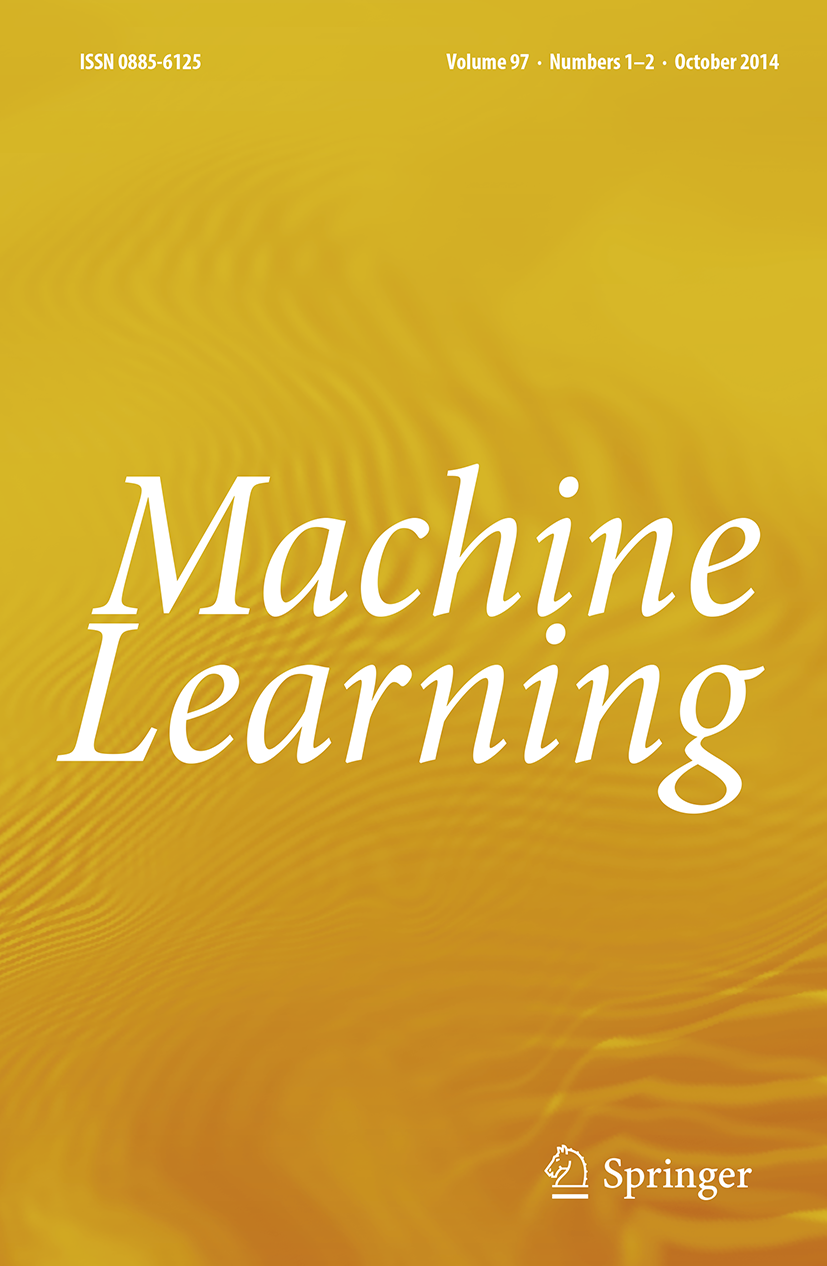link.springer.com/article/10.1007/s10994-006-6265-7
Preview meta tags from the link.springer.com website.
Linked Hostnames
22- 27 links tolink.springer.com
- 15 links toscholar.google.com
- 10 links todoi.org
- 9 links towww.ams.org
- 9 links towww.springernature.com
- 4 links towww.emis.de
- 2 links tocitation-needed.springer.com
- 2 links toscholar.google.co.uk
Thumbnail

Search Engine Appearance
https://link.springer.com/article/10.1007/s10994-006-6265-7
An algorithmic theory of learning: Robust concepts and random projection - Machine Learning
We study the phenomenon of cognitive learning from an algorithmic standpoint. How does the brain effectively learn concepts from a small number of examples
Bing
An algorithmic theory of learning: Robust concepts and random projection - Machine Learning
https://link.springer.com/article/10.1007/s10994-006-6265-7
We study the phenomenon of cognitive learning from an algorithmic standpoint. How does the brain effectively learn concepts from a small number of examples
DuckDuckGo
An algorithmic theory of learning: Robust concepts and random projection - Machine Learning
We study the phenomenon of cognitive learning from an algorithmic standpoint. How does the brain effectively learn concepts from a small number of examples
General Meta Tags
120- titleAn algorithmic theory of learning: Robust concepts and random projection | Machine Learning
- charsetUTF-8
- X-UA-CompatibleIE=edge
- applicable-devicepc,mobile
- viewportwidth=device-width, initial-scale=1
Open Graph Meta Tags
6- og:urlhttps://link.springer.com/article/10.1007/s10994-006-6265-7
- og:typearticle
- og:site_nameSpringerLink
- og:titleAn algorithmic theory of learning: Robust concepts and random projection - Machine Learning
- og:descriptionWe study the phenomenon of cognitive learning from an algorithmic standpoint. How does the brain effectively learn concepts from a small number of examples despite the fact that each example contains a huge amount of information? We provide a novel algorithmic analysis via a model of robust concept learning (closely related to “margin classifiers”), and show that a relatively small number of examples are sufficient to learn rich concept classes. The new algorithms have several advantages—they are faster, conceptually simpler, and resistant to low levels of noise. For example, a robust half-space can be learned in linear time using only a constant number of training examples, regardless of the number of attributes. A general (algorithmic) consequence of the model, that “more robust concepts are easier to learn”, is supported by a multitude of psychological studies.
Twitter Meta Tags
6- twitter:site@SpringerLink
- twitter:cardsummary_large_image
- twitter:image:altContent cover image
- twitter:titleAn algorithmic theory of learning: Robust concepts and random projection
- twitter:descriptionMachine Learning - We study the phenomenon of cognitive learning from an algorithmic standpoint. How does the brain effectively learn concepts from a small number of examples despite the fact that...
Item Prop Meta Tags
3- position1
- position2
- position3
Link Tags
9- apple-touch-icon/oscar-static/img/favicons/darwin/apple-touch-icon-6ef0829b9c.png
- canonicalhttps://link.springer.com/article/10.1007/s10994-006-6265-7
- icon/oscar-static/img/favicons/darwin/android-chrome-192x192.png
- icon/oscar-static/img/favicons/darwin/favicon-32x32.png
- icon/oscar-static/img/favicons/darwin/favicon-16x16.png
Emails
1Links
94- http://scholar.google.com/scholar_lookup?&title=A%20theory%20of%20the%20learnable&journal=Communications%20of%20the%20ACM&doi=10.1145%2F1968.1972&volume=27&issue=11&pages=1134-1142&publication_year=1984&author=Valiant%2CL.%20G.
- http://scholar.google.com/scholar_lookup?&title=Boosting%20the%20margin%3A%20A%20new%20explanation%20for%20the%20effectiveness%20of%20voting%20methods&journal=Annals%20of%20Statistics&doi=10.1214%2Faos%2F1024691352&volume=26&issue=5&pages=1651-1686&publication_year=1998&author=Schapire%2CR.%20E.&author=Freund%2CY.&author=Bartlett%2CP.%20L.&author=Lee%2CW.%20S.
- http://scholar.google.com/scholar_lookup?&title=Efficient%20distribution-free%20learning%20of%20probabilistic%20concepts&journal=Journal%20of%20Computer%20and%20System%20Sciences&doi=10.1016%2FS0022-0000%2805%2980062-5&volume=48&issue=3&pages=464-497&publication_year=1994&author=Kearns%2CM.J.&author=Schapire%2CR.E.
- http://scholar.google.com/scholar_lookup?&title=Extensions%20of%20lipshitz%20mapping%20into%20Hilbert%20space&journal=Contemporary%20Mathematics&volume=26&pages=189-206&publication_year=1984&author=Johnson%2CW.%20B.&author=Lindenstrauss%2CJ.
- http://scholar.google.com/scholar_lookup?&title=Large%20margin%20classification%20using%20the%20perceptron%20algorithm&journal=Machine%20learning&doi=10.1023%2FA%3A1007662407062&volume=37&issue=3&pages=277-296&publication_year=1999&author=Freund%2CY.&author=Schapire%2CR.%20E.